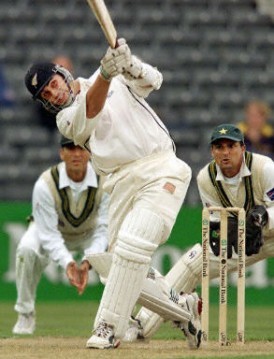“I was a little bit mismanaged through my early stages” : Mathew Sinclair
Ganeshbabu Venkat |
In Part one of his interview with CricketWeb, Mathew Sinclair talks about his Test Debut, his big knocks, the early part of his career and how things could have played out differently.
You started off with a bang in your Test career. Not many have accomplished a double-hundred on Test debut against a reasonably good West Indies side. Talk to us about the call-up, the lead-up to the Test itself and how you went about with that knock.
It was obviously a very special occasion for any young and upcoming cricketer to represent their country. Mine came through an injury. Matt Horne got injured in the first Test at Hamilton against that West Indies side, and I was called up two days after by Sir Richard Hadlee, he said “We’ve got some great news for you. Congratulations you’re in the next Test squad against West Indies.”
It came as a little bit of a surprise, but not shocking. I had a pretty good knock for the A team against the West Indies and I was scoring well in the domestic circuit too. So the form was good, everything was right really for me to have a go at playing Test cricket for my country and I was pretty excited.
Batting is all about scoring runs and I understand it starts to flow once you start scoring runs, but did you ever think, “Okay, I’m going to have a great start here” or something of that sort, did you ever think that you were going to end that Test with a double hundred?
To tell you the truth, I was very, very nervous, especially playing on the big stage as you would call it. It was a Boxing day Test, so it was quite a rarity in New Zealand and that was an occasion. As you said, it was against a very good WestIndies side. Brian Lara was their captain. Vivian Richards was their coach. Clive Lloyd was the manager. Courtney Walsh, obviously, is well-known, was playing, and Franklyn Rose too, so I guess it was a big mind over matter thing for me. I know that I could do it. All I wanted to do was actually just get off the mark and take it from there (laughs).
That was my whole goal and once I sort of got through that, as it was, it was a French cut four, and then Craig Spearman, my batting partner said, “Well, Mat, it’s actually your day today. Go and make the most of it” and I did. I ended up scoring an unbeaten 123 on the first day.
The following season, you scored 150 against the South Africans and scored another double-hundred against Pakistan in 2001. At that point you must have thought cricket is not a difficult game after all, especially scoring against the likes of Allan Donald, Shaun Pollock and Waqar Younis.
The knock against South Africa was quite special. It was in Port Elizabeth. The pitch itself was very similar to a New Zealand sort of wicket. It was quite slow. It suited my style of play, you could say. We were not particularly doing all that well on that tour. We never generally do well on a South African tour and I guess even it just sort of clicked for me. They put the ball in the right area for me to score. I was not getting runs as well and the team was not in a good position too, so I knew that I had to get as much runs as I could to create a good first innings score.
The likes of Donald, Pollock and Jacques Kallis were all playing that day and it was a very, very good South African side that actually dominated us right through that whole series. I had a bit of a lean stretch up until then, so I knew the pressure was on to score, and that 150 sort of made that up.
The game against Pakistan was at Lancaster Park, Christchurch. That was actually on a portable wicket, funny enough, they actually brought that wicket for that particular game. It was actually quite new for a Test match to be played on a portable wicket at that time. It was very, very flat, and yeah, the likes of Younis and Saqlain Mushtaq were there, I enjoyed batting on that surface just to again prove a point about going on and getting a big score, it sort of worked out quite nicely for me.
Do you think the spectacular start to your Test career set the expectations high? You were 26 years old at the end of the Pakistan Series, how did you handle those expectations?
Yeah, I found it quite tough because the media pressure was quite big. Obviously, here’s this new kid off the block coming in and doing what he did on his debut. No one had actually heard of a Mathew Sinclair. Of course, I was quite well-known in domestic cricket, but not internationally, and for me to go and do what I did against the West Indies did bring around a lot of pressure that I wasn’t quite used to, and that pressure was more on the lines of, “Ok, You’ve got your double. Now you’ve got to try and keep doing it every game” I found it very, very hard to maintain.
I also felt I was a little bit mismanaged through my early stages, so that made it really difficult, and when I mean mismanaged, I mean sort of just trying to live up to the expectations of a professional cricket player playing day in, day out. As you see, thinking like that that I could go out and score double centuries every time and it doesn’t work like that. Situations are different every day, and I guess form is a big part of that as well and confidence, and when those two things aren’t working right, then you’ve got a recipe for disaster.
It was some very high expectations. The other thing I will say is that after that West Indies Test, I thought I might be given an opportunity to carry on against them in the ODI’s since I was in good form, but I wasn’t selected, so what happened was I went straight back in to domestic cricket and then was left in the lurch for another four or five months, and then got back into Tests again. I felt like I had done what I needed to continue on with the team, and when I look back at it now and think maybe if I was given an opportunity to play the ODI’s after that Test match debut, then it could’ve given me a lot more confidence to being comfortable in that environment rather than waiting for a certain amount of time and then getting back into it again. Stop-start does not help either.
You mentioned about being mismanaged. If you had to elaborate, do you think it was the support structure, That was not in place with New Zealand cricket at that time?, What was lacking?
Well, I think nowadays you’ve got players associations involved and I think that has changed the whole dynamics for professional cricketers. Back then, we didn’t have that, so basically you were just handed a contract and said, “Here, you either take it or leave it.” Not only that, but also having a support structure around me for my cricketing career, having a proper manager that would actually sort of see me through to possibly life after cricket or looking at my next contract or actually looking at other areas to improve my game.
The other thing I talk about being mismanaged is actually being comfortable in a cricket environment. You tend to find it can be quite a selfish environment. Yes, it is very much a team game, but it’s all based around an individual’s performance. Now, my job was to score runs. If I wasn’t scoring runs, well, then I got dropped, and I guess the rotation policy in our selection back then was very, very brutal. You either scored or you are out, and that, for me, made it very, very uncomfortable, so that’s where I would also put the mismanagement part.
If we had to divide your career, we have to divide it in to two halves. From 1999,since you made your debut to 2002, and then a break of a year, 2003 to 2010,but at the end of 2001, you were averaging a very respectable 43.16, yet, you did not play a test in 2002. What happened in 2002? Why the break?
I think I owe the break more to the Australians than anything else (laughs), having Test matches against Australia was the reason. They were a very, very good side back then. I struggled a lot against the Australians. I think I struggled because I viewed them as great players rather than actually looking at them as peers. It’s that whole euphoria around playing the likes of a Shane Warne, Brett Lee and Matty Hayden you know, and you’re thinking negatively straightaway, because I think, “Well, heck, how am I supposed to score runs against the top side in the world?”
These are the other pressures that you actually get yourself into. Nowadays, you have sports psychologists that come in at you to deal with those anxieties and I think for me that was quite a big thing, and that really hurt me. When I played against the Australians I did not average particularly well, got dropped, came back again, in and out all the time, so it made it quite hard for a bit of continuity and that’s the way my cricket went. If you look at my first class record, it’s very, very good, and considering here in New Zealand, our wickets are very, very hard to play on, and to average, I think 56 for my first class team and 49 overall for first class average is very good. There’s a massive difference being comfortable at a first class environment and in an international environment, so yeah, there are two conflicts you could say.
When you made your back and forth from 2003 to 2010, which was a start-stop period,that must have messed up the whole psyche too as a player. What happened from 2003 to 2010 for you as a player mentally and on the field?
I think form was a big thing, not being consistent enough at that international environment. I also think if you look at how many coaches we actually had at the time from 2003 to 2010, I think off the top of my head, it’d be probably about five or so coaches during that time. I was fed lots of information, which probably didn’t suit my game. That played on my mind as well, whereas if they just let me go as to how I did in my debut, then that could have been a bit different.
I guess as a professional cricket player, you’re always looking for that added advantage of a coach. They do talk a lot about the old KISS principle, but that was never executed. I guess I got over-analyzed about what I needed to do or felt like I had to prove to the coach what I was actually doing, and I think it messed me up a little bit . Of course form matters too, but these small things can matter in a huge way. At this level you are not expecting someone to teach you how to play the cover-drive, that sort of stuff happened as well during that period from a coaching stand point.
Being dropped doesn’t help as well because it plays on your mind quite a bit. So every time I would actually go out there and play for New Zealand, I was actually batting for my place, which was not a great environment to actually be in as a cricket player. I’ve mentioned before about how cricket is very much based around a confidence game,and if you’re not confident, you’re going to struggle and would not be able to go out there and do the job the best you can.





Leave a comment